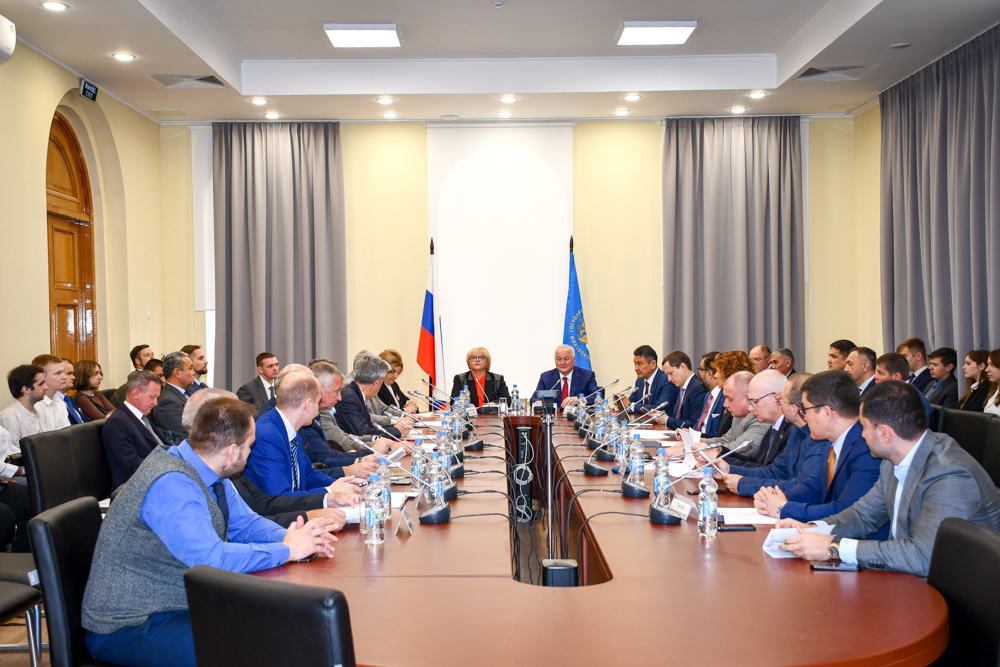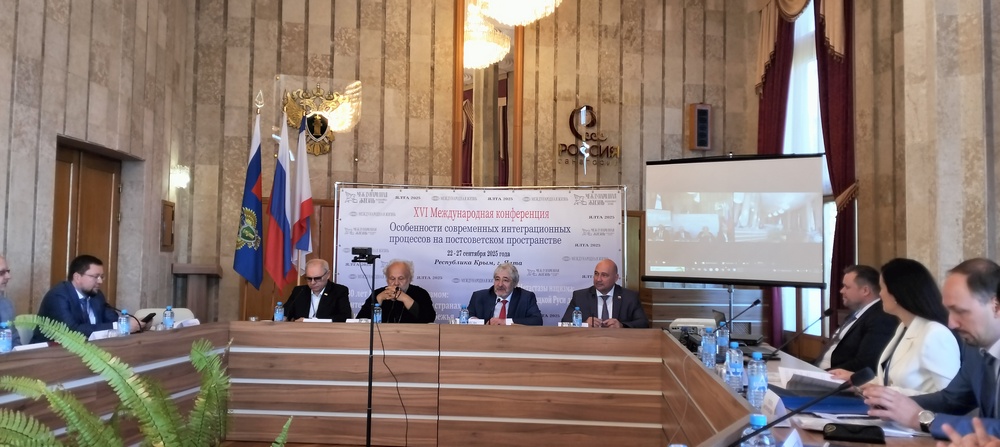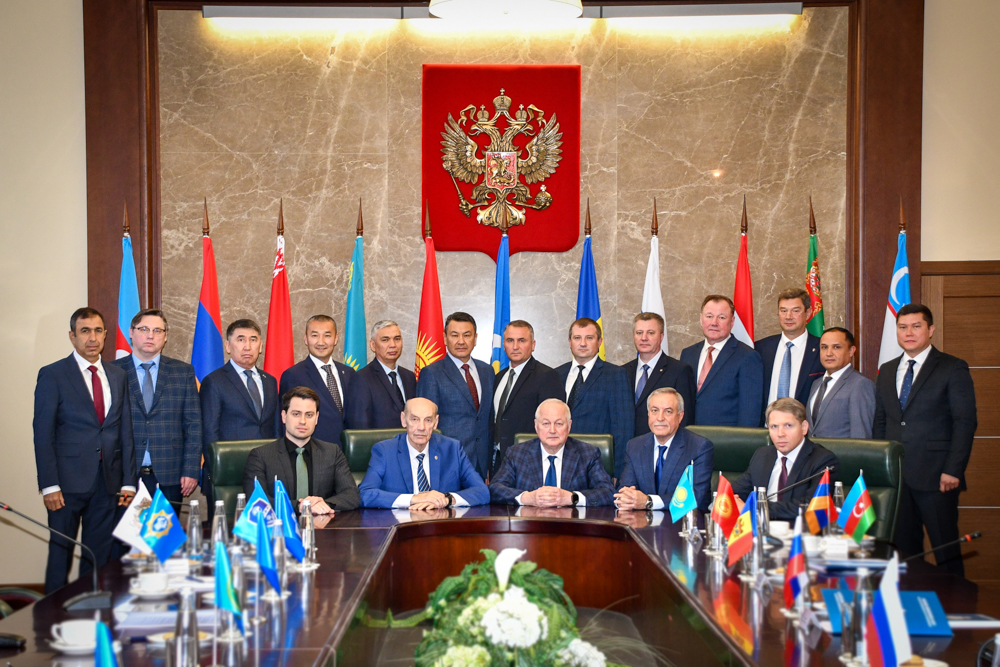December 17, 2014
The mercenary terrorism has gained a surprising development today. Contemporary international terrorist organizations pursue a mid-term goal to change the governance models in the entire sub-regions, to disintegrate states, to create new state formations. In this regard, the possibility for destabilizing states’ constitutional order in some regions through force solution of the internal problems significantly rises. What counteracting measures do the Commonwealth competent authorities undertake? This is the topic of our discussion with the Head of the CIS Anti-Terrorism Center Police Colonel General Andrey NOVIKOV.
– Andrey Petrovich, could you please tell us if the tendency of terrorist activity has changed over last years? And is there any link between the terrorist threats and the world geopolitical processes?
– It is the geopolitical and economical interests of the states which mainly define the quality of the terrorist threats and their intensity. But I would like to put the problem in a broader range. Today besides the states the transnational corporations and their supporting structures, for example, private military companies, play an active role in the geopolitics. Moreover, the terrorist organizations in some cases become not just the tools to solve geopolitical tasks but the active subjects which shape a new political landscape. First of all, I refer to such a geopolitics phenomenon as the Islamic State (author's note: a.k.a. ISIL - Islamic State of Iraq and Levant). Acquisition of territories of the sovereign states along with the economical infrastructure by means of systematic terrorist acts is an unconventional method of quasi-statebuilding. That is why the terrorist threats generally shall be viewed in a broader context of events - political, economical and ideological.
Today the terrorist activity is manifested against the background of the entire cascade of long-term events caused both by the second wave of the financial-economical crisis and continued local wars in the territory of the Greater Middle East, and by the chain of so called flower revolutions. Practically a new type of state crises has formed right before our very eyes. All these are the destabilization model technologies. And terrorism shall be considered as a tool of this stabilization.
Let me give few examples. Over the last years the key energy infrastructure facilities have become the potential sabotage-terrorist activity. We all noted one of the most important episodes of the Libyan events in 2011. There the oil producing facilities and marine terminals which provide for oil loading on the Mediterranean coast became the fist target of the armed groups. This trend of international terrorist groups' operation later entrenched itself in Algeria where the biggest gas producing plant was seized in January 2013 with all the consequences for the state that came with it. But the terrorist organization ISIL went event further. It gained control over oil producing and oil-refining clusters, platforms and even logistical corridors for energy resources transportation and marketing.
According to the experts' estimate, today as a result of seizure of the oil fields as well as banks' fixed assets, this organization has a sum exceeding 2 bln. dollars. Just think of this figure! No external financing, so call feeding, which is traditionally used by the terrorist groups of the previous "generation", is necessary. Besides, experts believe that is as result of dumping selling of the captured oil the ISIL gains almost 1 mln. dollars daily (!). Accordingly, with the continued world economical crisis and volatile prices of hydrocarbons, the crisis situations in the most important oil-exporting region stirred up by the expansion of the terrorist and religious political structures become a key economical instrument for maintaining acceptable prices for crude hydrocarbons.
In July 2014 the Russian Federation initiated the US Security Council statement on inadmissibility of oil trade with terrorist organization operating in Syria and Iraq. The statement recalls the obligation of the UN member states to prevent and suppress the financing of terrorism. The Security Council directly raised a serious concern over the seizure of oil fields and oil pipelines in Syria and Iraq by the terrorist groups. Moreover, the US SC emphasized that any form of oil trade with such terrorist organizations would be illicit and considered as terrorist financing and might lead to sanctions.
– You mentioned "international terrorist groups". What are they? Do they represent some new format?
– Sure. Having assessed modification of the contemporary terrorism and religious-political extremism, we also note a change in the quality of those destructive phenomena.
Today many states face a new format of terrorist groups and associations. We are talking about a comparatively new phenomenon: international terrorist groups which activity may pose a threat not just to border security but the sovereignty and legitimacy of the state power. The composition of such international terrorist groups integrate representatives of both domestic ethnic groups and representatives of nationalities the center and periphery of which are located in other regions. As a rule they are integrated by the religious criteria, regardless of the citizenship.
Besides, the international terrorist groups pursue quite clear mid-term goals to change the governance models in the entire sub-regions, to disintegrate states, to create new state formations. For example, the ISIL internet resources publish a map of claimed future boundaries of this organization. The creators of Caliphate believe that is shall be established on the territory of some CIS member-states. They include Kyrgyz Republic, Kazakhstan, Uzbekistan, Azerbaijan, certain North Caucasus regions and Republic of Crimea of the Russian Federation. In this regard, the security agencies, special services and law enforcement authorities of the CIS states have a crucial task to identify those citizens of the Commonwealth states who participated and participate in the activity of the illegal armed formations abroad, including the ISIL. This shall prevent their highly probable participation in organization of terrorist acts in their native lands.
– How many CIS citizens fight for ISIL today?
– It is should be noted that the core of ISIL are the fighters who opposed the American troops during their mission in Iraq, as well as the fighter groups who attempted to overthrow the government of Bashar Asad in Syria. According to the last news, their number stands at 31 thousand individuals. Al Jazeera reported 100 thousand people fighting for ISIL. It is known that the fighters from Great Britain, Germany, France, Saudi Arabia, Morocco and Canada have joint the ISIL. Citizens of the CIS are also there.
In September this year the Ministry of National Security (MNS) of the Azerbaijan Republic officially informed about 26 citizens of the state taking part in fighting for ISIL. The Main Investigations Department of the Azerbaijan MNS opened a criminal investigation on the respective articles of the Criminal Code of the Republic, including creation and participation in the illegal armed groups outside Azerbaijan, involvement of teenagers into criminal activity, etc.
According to the National Security Committee of the Republic of Kazakhstan, around 300 Kazakhstanis are fighting for the Islamic State today. With that, they formed a so called Kazakh Jamaat, and half of them are women.
Our analysts noted the following. The Islamists who left Russia formed in 2013 an enclave in the North of Syria called "Independent Caliphate" with independent management and quite strict Sharia norms. Such independence caused a conflict with the units of the so called Free Syrian Army which resulted in 30 people killed in the course of internal armed clashes.
I will be open in saying that the problem of counteracting mercenary activity has been worked up by us long ago and the agenda has already included undertaking and implementation of the coordinated measures to prevent and avoid terrorist threats posed by the fighters who took and continue taking part in the armed hostilities as part of the terrorist organizations and illegal armed groups outside the Commonwealth. We take into consideration the desire of the ideologists and customers of the terrorist activity to create tension in the territory of our states.
– All what you mentioned above gives me the right to ask a very important question. Can we say that today there is a common counter-terrorism security system formed in the CIS space?
– Such system has definitely been formed. And it was not done yesterday. The Commonwealth states founded the Anti-Terrorism Center 15 years ago when it became clear that the terrorism was transnational and that the individual efforts of the states to combat this threat were insufficient.
Properly speaking, the common system of counter-terrorism security in the Commonwealth space is made up of the well tested components. As for the legal aspects of this system, this is a model legislation of the CIS member-states and a system of bilateral and multilateral agreements and contracts between the states in counteracting terrorism. The practical aspect of this system is implemented in the form of joint search and preventive operations, annual joint staff command exercises and trainings, variable scientific and analytical projects conducted by the competent authorities of our states. Besides, we managed to implement a program of inter-state search of persons who committed crimes of terrorist or extremist nature and fleeing from justice. Over the last few years we have conducted multilateral regional expert consultations aimed at elaboration of coordinated decisions on most complex counterterrorism issues. The question is first of all about security of the Central Asian states, including amid earlier declared withdrawal of the International Security Assistance Forces from Afghanistan and activation of the members of the "The Terrorist International".
Organization-wise, the Commonwealth common counterterrorism security system is composed of specialized councils of the power blocks of the agencies, including the security agencies, special services, ministries of interior and defense, and border agencies of the states. They include Council of the Heads of Security Bodies and Special Services of the CIS member-states, Council of the Ministers of Interior, Council of the Commanders of the Border Forces and others.
The CIS Anti-Terrorism Center, a specialized agency of branch cooperation founded for coordination of our states' efforts in combating terrorism, takes a special place in this system.
– Could you please tell us in more detail about the Center's interstate search work? Do you hold any specific activities in this regard?
– The issues of implementation of interstate search of the persons who committed terrorist crimes have been repeatedly included into the agenda of the meetings of the CIS Council of the Heads of Security Bodies and Special Services.
Our Center has performed a large amount of work to organize a list of persons placed by the Commonwealth states on interstate wanted list for committing terrorist crimes. There is a list of wanted persons to be arrested. As a result, we were able to create an information array of the Specialized data bank which contains information on the persons placed on interstate wanted list and charged with crimes of terrorist nature. As of today the data bank lists 2486 persons.
We systematically forward information on possible location of the wanted persons to the heads of competent authorities of the CIS member-states for further check and use. In practice we initiated annual target coordinated search operation "Tral-Antiterror". I would like to stress that our joint activity brings specific results.
Since 2010 our Center has collected information on possible location of over 800 wanted persons. Under the CIS ATC information shared with the partners for facilitation of interstate search, over 50 persons placed on interstate wanted list and charged with crimes of terrorist and extremist nature have been detained.
– It would be logical to assume that other state agencies are also involved into the interstate search system.
– You are absolutely right. I would like to note that we have very good partnership relations with the Office for the Coordination of the Fight Against Organized Crime and Other Dangerous Types of Crime on the Territory of CIS member-states (OCFO). We proceed from the fact that the criminals' search function in most Commonwealth states falls under the competence of the internal affairs bodies. That is why the Center together with the OCFO developed initiatives to intensify and increase efficiency in this most important field of work, which have obtained approvals of both security agencies and internal affairs bodies of the Commonwealth. I am sure that the coordinated application of the specialized potential of the CIS dedicated agencies in the interest of suppression of the terrorist and extremist organizations in the territory of the Commonwealth member-states can bring an expected outcome.
In the course of interstate search operations, the CIS ATC also attracts capacities of the financial intelligence agencies, which finance transfer monitoring technologies allow to a high degree of accuracy identify location of the persons wanted for crimes of terrorist nature. Within the frameworks of cooperation, we verify the information contained in the CIS ATC Specialized Data Bank against the data obtained from the financial monitoring service. This cooperation is absolutely necessary since only in the Commonwealth member-states there is a big number of the subjects included into the national lists of entities and individuals implicated in terrorist and extremist activity.
– It is impossible to imagine an adequate fight with terrorism in the territory of the Commonwealth states without respective border control. What activities are undertaken in this field?
– While building a CT security system we could not but consider this fact. Both the internal affairs bodies and our special services cooperate with the border agencies of the Commonwealth states in creating a secure shield against the terrorists striving to infiltrate through the CIS borders. The Anti-Terrorism Center does not stand aside from these issues.
Analysis of information on location of the persons placed on interstate wanted list and charged with crimes of terrorist and extremist nature allows us to state this category of citizens undertakes active terrorist operations not just in the territory of the CIS states but in the territory of other countries of the world that is exhibited in their conducting of extremist work and in direct participation in combat operations against governmental troops of the countries where the armed conflicts periodically break out. The persons wanted for crimes of terrorist and extremist nature took and continue taking part in the combat actions in the territory of Russia, Lebanon, Syria, Afghanistan and other countries. Those persons arrive to the territory of those states by crossing the borders of the Commonwealth states as well.
Let me add that the interstate search is possible in principle with the attraction of the structures which activity directly involves monitoring of persons through the state borders of the CIS states. First of all, they are the border control bodies. In some states such structures are independent. Accordingly, the Anti-Terrorism Center actively cooperates with the Council of the Commanders of Border Forces of the Commonwealth states and its Coordination Service.
– And the last. What are the objectives assigned to the Anti-Terrorism Center? What projects do you intend to implement in the nearest future?
– First of all I would like to say that the Center never stood still and keep constantly developing. We laid down specific directions of our activity into the Concept of improvement of CIS ATC operation approved at the Council of the Heads of Security Bodies and Special Services of the CIS member-states held in November this year in Astana.
Let me mention just few of them. First of all, it is provision of the competent authorities of the Commonwealth states with qualitative and timely analytical and forecasting information. Out Specialized Data bank will be also further developed. This involves both integration of advanced information technologies and search of new sources of information necessary for solving the tasks assigned to the Center. Analytical studies made by our analysts also require search and integration of new software and hardware for processing of the obtained information. New technologies are also required for solving analytical tasks through mathematical modeling of the operational situation in the field of counter-terrorism and counter-terrorism.
Much attention in our work will be paid to the detection of those forms and methods of the terrorist activity which in the nearest future will be most demanded by our enemy - international terrorism. They include hi-tech terrorism which contours are more and more visible in the contemporary computerized and technologically dependant modern society. They also include new forms of involvement into terrorist and extremist activity linked with manipulation of the public and individual opinion, external programming of the human destructive behavior.
All these questions are in focus of attention of our experts in modeling terrorists' possible actions. We also consider them while preparing scenarios of our future joint anti-terrorism exercises and trainings with participation of the CIS states, forming agenda of conferences of the expert and scientific society, elaborating educational and advanced training programs for the personnel of the CT units, etc.
Improvement of the terrorists' interstate search system remains one of the priority directions of the Center's operation. In this regard we will continue expanding frameworks of our cooperation both with the CIS authorized agencies and other organizations. Here I first of all refer to the International Criminal Police Organization INTERPOL. Previously we successfully cooperated under a number of projects, including Kalkan focusing on searching terrorists in the Central Asian states. We hope for development of this practice in future.
It is obvious that the existing tendencies towards further globalization of the international terrorism require us to coordinate actions not just in the Commonwealth but to strengthen links with the partners from other international and regional organizations. We are planning to augment the potential of our cooperation with the specialized agencies of the UN, OSCE, ASEAN and continue work within the Global Initiative to Combat Nuclear Terrorism.




